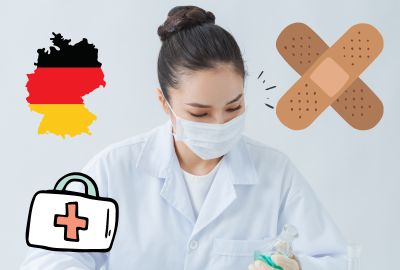Navigating the complex waters of the medical school assessment process in Germany can be a daunting task, especially for those who are not native speakers of the language. This blog post aims to shed light on the intricacies of this process, providing a comprehensive guide that is both informative and engaging for language learners studying German. From understanding the basic requirements to getting to grips with the cultural context, this article has got you covered.

Understanding the Basics: "Das Medizinstudium"
In Germany, becoming a medical doctor, or "Arzt/Ärztin," involves a rigorous and highly structured educational process known as "Medizinstudium." This journey begins with gaining admission to a medical school, or "Medizinische Hochschule," and entails a series of assessments designed to evaluate the applicant's suitability for a career in medicine.
The Entry Requirements
Before diving into the assessment process itself, it's essential to understand the prerequisites. In Germany, students must hold the "Abitur" or an equivalent secondary school leaving certificate, demonstrating a high level of proficiency in subjects relevant to medicine, such as biology, chemistry, and physics. Language learners should note the importance of achieving a high level of German, typically evidenced by passing a recognized German language test, such as the TestDaF or DSH.
The Assessment Process
The assessment process for entering medical school in Germany is multifaceted and includes the following key components:
1. The TMS Test
The "Test für Medizinische Studiengänge" (TMS) or Test for Medical Studies is an aptitude test designed to assess abilities relevant to the study of medicine, such as problem-solving and understanding of scientific principles. While the TMS is not mandatory for all universities, achieving a high score can significantly enhance an applicant's chances of admission.
2. The Numerus Clausus (NC)
The Numerus Clausus (NC) refers to the limited number of places available in medical schools and is a crucial factor in the admission process. The NC is essentially a grade point average cut-off, derived from the applicant's Abitur scores. Given the high demand for medical study places, the NC for medicine is usually among the highest of all university programs.
3. The Interview Process
Some medical schools in Germany also conduct interviews to assess candidates' motivation, communication skills, and suitability for a career in medicine. These interviews can be particularly challenging for non-native speakers, highlighting the importance of proficiency in German.
Cultural Context and Tips
Understanding the cultural context of the German medical education system is paramount for language learners. The German approach to education emphasizes self-discipline, critical thinking, and independence. Medical students are expected to be self-motivated and proactive in their studies. For language learners, it's essential to not only focus on language proficiency but also to familiarize oneself with the German academic culture.
Tips for Language Learners:
- Immerse Yourself in the Language: Engage with medical terminology in German as early as possible. Reading medical journals, textbooks, and articles in German can be incredibly beneficial.
- Practice Under Pressure: The TMS and interviews can be stressful. Practice your German under timed conditions and simulate interview scenarios with native speakers.
- Seek Support: Many universities offer preparatory courses and language support services for international students. Don't hesitate to take advantage of these resources.
After Admission: The Road Ahead
Once admitted, students embark on a journey that typically lasts six years, culminating in the State Examination ("Staatsexamen"), which is required to practice medicine in Germany. The curriculum is divided into pre-clinical and clinical phases, with a practical year ("Praktisches Jahr") towards the end. Language learners should continue honing their German skills throughout their studies, as proficiency is crucial for patient communication and professional success.
Conclusion
The assessment process for entering medical school in Germany is challenging yet rewarding, offering a pathway to one of the most respected professions in the country. For language learners, the journey demands not only academic excellence but also a deep commitment to mastering the German language and understanding the cultural nuances of the German medical education system.
We hope this guide has illuminated the path ahead for aspiring medical students. For more insights and resources on navigating academic and professional landscapes in Germany, visit our platform. Together, let's embark on a journey of learning and discovery.
Call to Action: Are you ready to take your German to the next level and pursue your dream of studying medicine in Germany? Visit our platform for more resources, support, and guidance on your journey to becoming a medical professional in Germany.